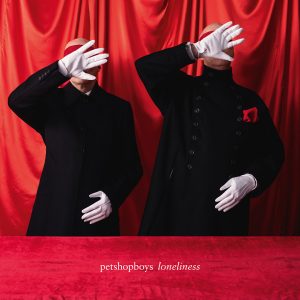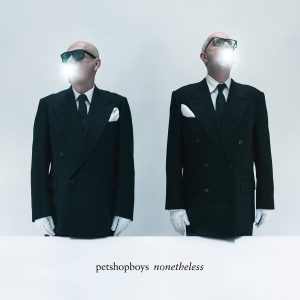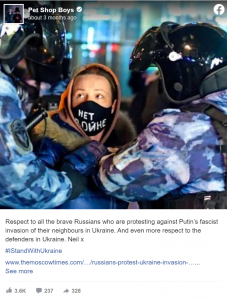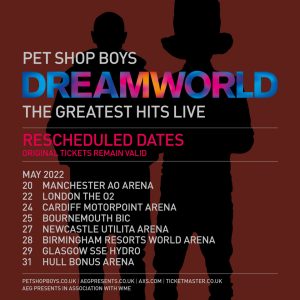‘My entire life is grounded or founded on, not just a coincidence but by one chance meeting with Chris Lowe. If I hadnt gone into that shop at that particular moment or if Chris hadnt come into it when I was actually there, the Pet Shop Boys would never have happened.’25 years after he first bumped into Chris Lowe in a Kings Road Hi Fi Shop and 22 years after their first number one hit West End Girls, the Pet Shop Boys remain one of the worlds biggest pop bands, and Neil is the first to admit hes increasingly interested in the forces of fate and serendipity.‘That episode to me, as time goes on, seems more and more extraordinary, because it changed my entire life,’ he muses, ‘I even had the feeling the moment I met Chris that it was going to change my life, actually. And it all happened in a musical equipment shop.’Fast forward to the present and the pair (whove remained best friends and musical partners throughout their career) are just about to release their already acclaimed latest studio album Fundamental, a record thats explicitly (and controversially) themed around the rise of religious fundamentalism.‘Im against fundamentalism of any sort; I think we all are, arent we? We dont want to go back to the seventh century, thank you. I think we take religion too seriously,’ Neil explains.‘As a society, here in the UK, we dont really respect our state religion as it is, whether its the Church Of England or Christianity, sure we pay a bit of lip service, for example, we might like the music and the incense and all the rest of it, but we can laugh at it nowadays and we can mock it pretty much with no threat,’ he continues.‘So I resent the fact that we are meant to take other religions so seriously and I think we have a right to mock other religions but that unfortunately is a dangerous thing to say nowadays, though it shouldnt be.’A former Smash Hits journalist and notoriously waspish critic of politically conscious pop stars in the past, hes sensitive to accusations of hypocrisy though equally determined to speak out, he insists, with civil liberties the issue hes most concerned about.‘Some of our fans have been complaining that the Pet Shop Boys have gone political, because of course weve always slagged off groups for being political in the past, but what I dont like is people being self-righteously political in a way that gets them lots of publicity, not mentioning any names,’ he explains.‘To me what matters in particular is the issue of ID cards and personal freedom, specifically personal freedom being curbed by the supposed war on terror and by fundamentalism and by people taking religion too seriously.’Though taking themselves too seriously is a charge the Pet Shop Boys have often faced, the duo have always used humour as a core component and new album Fundamental is similarly constructed, despite, even because of, its serious intent.‘We chose Fundamental as the title precisely because it is a dangerous and provocative title though weve displayed it on the front cover in lights and its put in a sort of show business context,’ says Neil. ‘I think its good to deal with serious politics in a light way, its more powerful than dealing with them in a serious way sometimes.’Singling out two new songs as examples, Im With Stupid (a track inspired by the relationship between Tony Blair and George Bush) and Lunar Park (with the words, I was just comparing America and its culture of fear to a fairground) Neil admits he prefers directness these days, with ridicule a powerful tool.‘I feel Im with Stupid is more of an effective political song than Lunar Park, which is also basically a sort of political song, because Im with Stupid is funny,’ he declares, ‘And I think laughing at politicians and all the rest of it is quite a good way of neutering them slightly. Fundamental is deliberately provocative. The album is dedicated to those two Iranian teenagers who were hung recently for being homosexual.’Skrufff (Jonty Skrufff): Starting with Fundamental, would you say it was an easy album to make?Neil Tennant: ‘Id say it was an enjoyable record to make. When we started writing songs at the beginning of last year, the songs were really flowing. We wrote sixteen songs in three months of which I suppose eight ended up on the album. Chris and I really enjoy writing songs generally, we do interviews and people ask how it is we are still writing songs together, like we should have broken up by now, which we always find a bit weird. Then we almost get embarrassed that we havent broken up yet. Chris and I are very good friends and we have a lot of fun making music; I think we find the process of writing together stimulating. For Fundamental, we brought Trevor Horn into the album because he is an amazing guy and a real record producer. It was a bit like making a film with many re- shoots, where you spend a lot of time beforehand setting up the cameras and getting the lights right. With Trevor you have many musicians coming through and experimenting, hes not a one take wonder type of producer. Its an interesting way to work for us, Chris and I would normally work in a quicker way, but we appreciate what Trevor does in order to get the sound right.’Skrufff: Was it a matter of giving Trevor Horn carte blanche?Neil Tennant: ‘No, he didnt get carte blanche at all, this was essentially a collaboration between us and Trevor. We liked the fact that he came back into pop music with that Tatu single he produced a few years ago, because until then he had been busy mainly doing a lot of film work. He hasnt done a lot of pop music since the mid eighties except always producing Seals albums when they come out, so we wanted to bring him back into what he does well. Wed written some songs, like the one called The Sodom and Gomorrah Show which is quite an epic, and we thought Trevor could really make something out of this, rather than it being a slightly standard Pet Shop Boys four on the floor dance thing. We really worked on that track and spent ages working on it to make it something new and different.’Skrufff: The track I like the most is Lunar Park . . .Neil Tennant: ‘Thats Trevors favourite track too. He thinks it sounds like Pink Floyd. I dont really know as much about Pink Floyd as he does, but I do like the songs chord change, it keeps on going round. We worked on that track for a long time which, together with ‘The Sodom and Gomorra Show’ are the ones that took the longest.’Skrufff: Were you feeling particularly creative on this album?Neil Tennant: ‘If you take Lunar Park as an example, I have ideas for songs all the time, like titles and concepts. Id written Lunar Park down as a title first and also Id written down the line Its always dark in Lunar Park, then I saw Michael Moores film ‘Bowling For Columbine’ which I didnt particularly like on the whole, though I thought the first part was really good where hes talking about the culture of fear in America and how it is used. I also saw some interesting documentaries that a friend of a friend of mine made about Al Qaeda and they both had some influence on me in terms of lyrics. I have a house in County Durham where we record sometimes and I have a grand piano there- I went out one day to buy a sofa and came back with a grand piano from an auction room- and I found that chord change at the start which sounds really good so I started to write. The song didnt have a chorus at first, then later I took it to Chris and he wrote the chorus. With the words, I was just comparing America and its culture of fear to a fairground, which is what a Lunar Park is. It fascinates me this idea that people enjoy being scared; thats why we go on roller coaster rides, thats why we watch horror films, and then its presented like that in the news, a mixture of thrilling but ghastly events aimed at frightening us. I know the BBC Nine Oclock news is not like that, but Im talking about America, Fox News and the whole thing. I just wanted to draw a parallel there.’Skrufff: Given that the album is called Fundamental, do you see the gay rights issue becoming a big clash between fundamentalists and secular society?Neil Tennant: ‘Well I hope not, but there was a story in the a paper the other day where the Iraqi cleric Al Sistani, or whatever hes called, has issued a fatwa against gays. Has he sort of denied it now?’Skrufff: I think he has taken the fatwa off the website but he hasnt formally retracted it
Neil Tennant: ‘What is the moderate Muslim position on homosexuality? What actually is it? I think its actually something reasonably horrifying. I read that some guys have recently been killed in Iraq for being gay. But actually in Britain I find the whole gay issue a bore really, Ive always said it is a political issue. The whole idea of gays was created in the 1970s as a political reaction against oppression and as the oppression fades away, so the idea of gay will fade away and we will lose our obsession with someones sexuality, which I still believe is a weird thing. I also feel its forcing people to be either gay or straight or whatever. For a lot of people their sexuality is straightforward, but for many others its not. Its a sort of cultural thing, like if you are a homosexual you are supposed to be interested in things like Judy Garland, which again was a cultural phenomenon of oppression. Then suddenly religion comes along and you suddenly realize, I think we all have to realize, that liberal rights, dear old dreary liberal rights, have got to be continually fought for. Its like anything else in life, you dont climb up to a plateau where the sun always shines, you are always marching on relentlessly. Nothing stands still and liberal rights, which are the easiest thing in the world to sneer at, have in fact taken a long time to create, particularly in the United Kingdom. We really have to fight to make sure we keep them.’Skrufff: I didnt realize youd played live as much as you have. What kind of show are you planning for the festivals?Neil Tennant: ‘We are planning a sort of theatrical presentation and we are working with a designer called Es Devlin, whos done a lot of opera at The National Theatre and also designed our musical Closer To Heaven. Shes come up with an amazing presentation, which I dont want to give away. Weve also got a great young choreographer called Hakeem Onibudo who Es found for us. Theres going to be two Pet Shop Boys, two singers, two dancers, films plus other backing singers. Its going to be really interesting.’Skrufff: Youre playing at Serbias Exit Festival in July, for you guys is it another festival along a series of them?Neil Tennant: ‘It is, but I was aware, looking and reading the stuff they sent us that it was quite a serious festival, very serious about electronic music amongst other things. Funnily enough on our last tour, the music we played beforehand was a piece by a group called Novi Sad though I hadnt realized that Novi Sad was a place until I saw the information about the festival. Exits one of the festivals were looking forward to the most.’Skrufff: Do get you get real natural highs when you are onstage in front of 50 000 people?Neil Tennnant: ‘Yes, when its working totally. Weve been on quite a journey with regards to live performance, in that we didnt use to perform, originally we never performed live. Our first proper live performance was at the Fridge in 1984, when we just played three or four songs. Then in 1989, since we always had this idea of doing a theatrical thing, we worked with Derek Jarman. Two years later we did the English National Opera tour with Es Devlin. One of the reasons we did that was to hide behind them and also we wanted to do something that was totally un-rock. Then in the late nineties we did a show at the Savoy Theatre for three weeks which lost money, so our manager suggested to break even, we performed the show at some festivals so we did the Roskilde festival. Id never been to a rock festival in my life before and suddenly we were headlining the biggest one in Europe. It went down amazingly well actually, and we started to quite like the idea of doing festivals in the summer. Its a nerve- wracking thing, because people havent necessarily paid to see you, they might have paid to see The Red Hot Chili Peppers. I would never have thought I would live to see the day where the Pet Shop Boys would follow the Red Hot Chili Peppers on the stage and go down as well as we did, or follow Beck onto a stage where actually we didnt go down as well as he did. Its a very interesting arena. We also did Glastonbury five years ago; I think when youve got a good collection of songs that people sort of know, it helps to create that feeling of celebration, which ultimately is what a festival is about. When it works it brings together that group celebration and thats why we really enjoy doing them.’Skrufff: I read about you meeting West End Girls producer Bobby O two years to the day after meeting Chris in the early 80s, what made you speak to each other in the first place?Neil Tennant: ‘I was just standing there, Id just bought this synthesizer and wanted to play it through my stereo system, so an assistant was welding a lead for me that went from the two pin thing to a jack plug, at the back of the shop. It took about fifteen minutes when Chris came in to buy a cassette or something. Chris has got that sort of very charming quality; I cant remember what we said initially, but we started talking about keyboards. In those days, to have a synthesizer was quite something. I was very impressed that I had one, Id bought it without even knowing how to play it. I think I thought it was going to have a speaker in it. He lived just around the corner from me, I gave him my phone number and he phoned me up a couple of days later, so we arranged to go for a drink. My recollection is that we almost immediately started trying to write a song together. We talked about music a lot, Chris had very different taste in music from me, he liked Bodytalk by Imagination.’Skrufff: Didnt you like that song?Neil Tennant: ‘I was a musical snob, so even if I did, I would have never admitted it. When I worked at Marvel Comics, one of the graphic designers there was a DJ who loved Donna Summers records and I used to tell him they were shit, though in my heart of hearts I knew I really liked them too, but in those days I was more into punk rock so I couldnt reveal I liked disco. I was one of those NME journalists who couldnt declare what they really liked, although secretly I did like Abba. In that phase of my life I probably didnt go to clubs very much, but Chris did, he was very different from me and between us we created a musical entity that retains both of our individual personalities. I think that really showed when we did the Back To Mine compilation last year; if you played the two records simultaneously you could recreate the Pet Shop Boys sound, because you would have something like Elgar playing over house music and the electronics playing over I Was Born This Way’ by Carl Bean.’Skrufff: England is awash with cocaine addiction stories and Dave Gilmour and Andy Bell have openly spoken about it, how have you guys managed to avoid not to become a casualty?Neil Tennant: ‘I think, from the two examples you gave, it could either have something to do with fame or with the people they are perhaps surrounded by
I dont know.’Skrufff: Dave Gilmour was blaming the people who were around him were effectively using him, so he became the gu that was buying it and he had a load of dodgy friends who took from him . .Neil Tennant: ‘Well, because hes got pots of money. I imagine thats why it would happen, which I agree is totally unfortunate, but its not how we behave, though we do like drinking, for example. Having said that, Chris is someone who can go from playing a concert to however many thousands of people, depending on what the show is, straight to the hotel and go to sleep immediately, which I find almost irritating because I cant do it. I just sit there drinking red wine, then I go bed. We do have parties sometimes, but when you are on tour you cant party extensively, because I dont have the worlds strongest voice so Im very conscious of not fucking it up.’Skrufff: Have you gone through many existentialist crises, those Why am I here? What is it all for? moments?Neil Tennant: ‘Yeah, you can sometimes, definitely. When we do concerts, for example, I am always astonished just before we go onstage, that I am actually doing this. That aspect of making music is something I never ever thought Id do. You feel very exposed on stage. Really exposed. Sometimes if you think the audience isnt into it, its a very naked feeling; you think Why am I doing this? I remember feeling like that a few years ago, and this actually happens only in Britain, never when were abroad, when w were playing in Grimsby. Not to knock Grimsby, but we were playing in some weird sports hall there and it was only half full. It was a classic weird collection of Pet Shop Boys fans, i.e. rock fans, people from the local gay club, people who listened to the local oldies station, all standing uneasily together and you could see them all. I just thought I dont know why Im doing this. I should stop doing this, its not that great. Then of course, the next night goes on to another, which happens to be fantastic. I dont know if thats an existential crisis, but there are times when you think ;how long can it go on for? Then again, if we werent writing songs that we really believed in, I guess we wouldnt be doing it. I love the songwriting process. When we played our tracks to Trevor Horn for the new album, he said they were great. Its rare to have someone coming in whos got all these songs you really want to work on. Once we went to the studio with Brian Eno, who we always wanted to work with, but one of the things Brian Eno does, is come up with strategies to help you write songs. We arrived in the studio with a cassette of twelve funky demoed songs; we could have written completely new songs with him, its something that comes naturally to us, like a real energy flow about songwriting in the Pet Shop Boys. We could bring out two albums a year if we wanted to. To go back on the existential crisis question, there will always be people who will think we were big in the eighties, why are we still carrying on? We see the Pet Shop Boys as a continuing creative project where there is a consistent quality across the whole period. There are obviously times when were more popular than others, everyone in their career has some sort of peak, but at the end of the day its a creative project, so we may find ourselves in Trafalgar Square playing music for Battleship Potemkin, which is as important to us as being number one with on Top Of the Pops.’Skrufff: How much does your happiness coincide with the peaks and success? Is there a correlation?Neil Tennant: ‘Personal happiness and career success dont necessarily coincide at all. During the entire run of The Pet Shop Boys initial success from 1986 to 1989, one of my closest and oldest friends from Newcastle was in a hospital with AIDS. I was always there with him, so I had this incredibly savage contrast during the whole of that period. He died just before our first tour in 1989, which in my head marks the end of the first phase of The Pet Shop Boys; that tour starting and this friend of mine dying, so that wasnt probably the most settled phase in my life as it should have been. There are times of course when it all coincides harmoniously. Making an album, for example, can be a very happy experience. Last year I was very happy making the current album. Little things made the whole experience particularly pleasant, for example I live in Chelsea and I would have a lovely walk across the park everyday, also Trevor likes to talk endlessly about politics and religion, about the Second World War and other things, which I also enjoy. That was quite a happy time for me on the whole.’Fundamental is out shortly on EMI/ Parlophone.
Taken from: http://www.Skrufff.com
Interviewer: Jonty Skrufff





